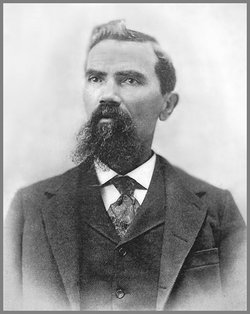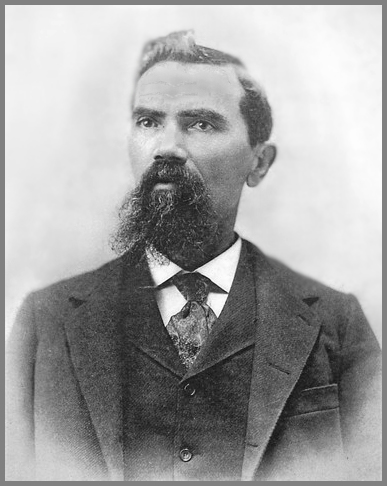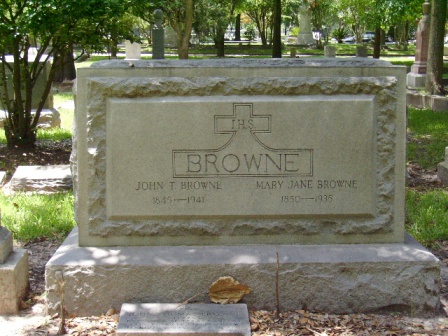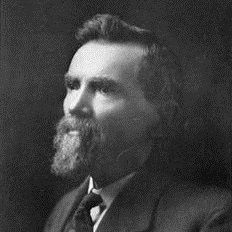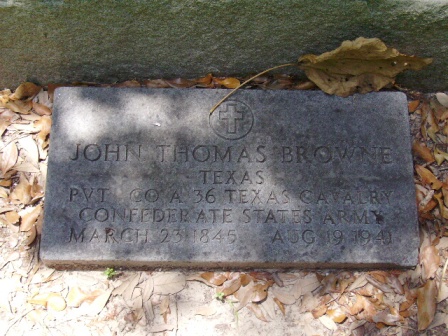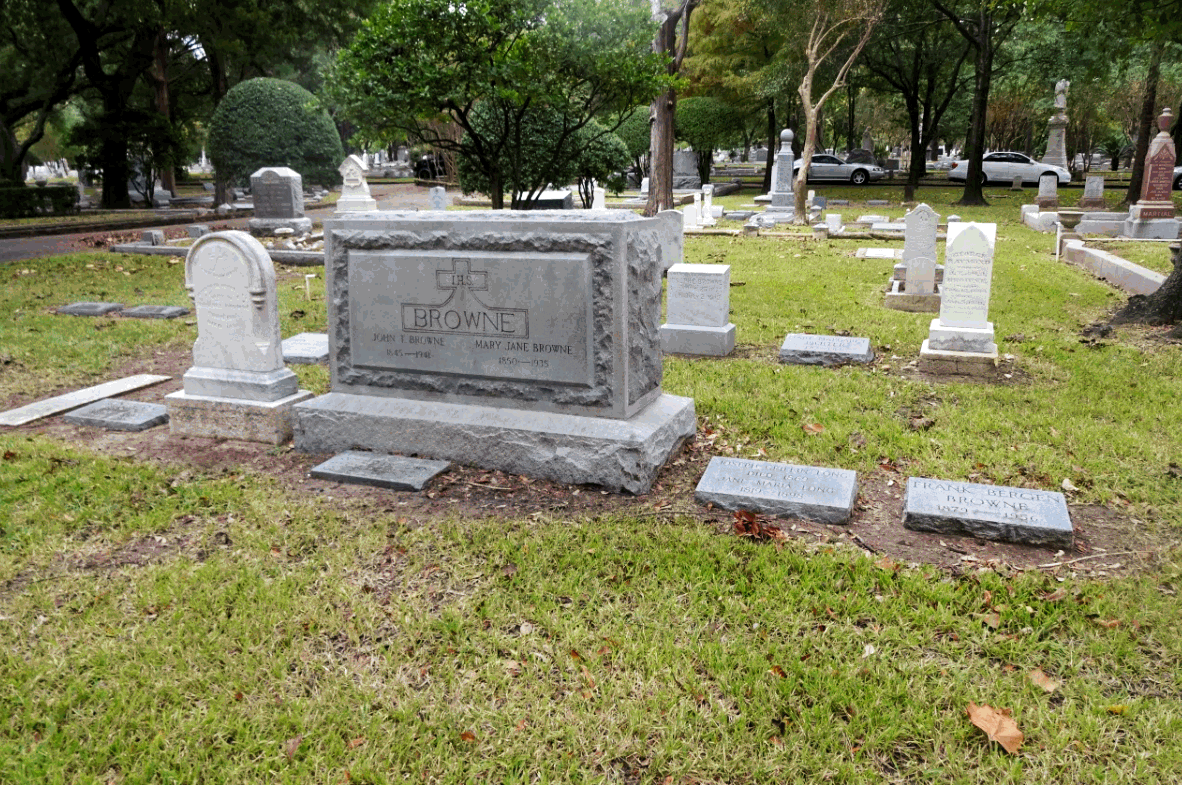John T. Browne was born in the village of Ballylanders, county Limerick, Ireland, on the 23d day of March, 1845. His parents, Michael and Winnefred Browne, were natives of the same place and resided there until 1851, when, with their family of five children, they emigrated to America, and settled in New Orleans. In that city, the same year of the arrival, the father died, and, some time during the following year, the mother moved with her little ones to Texas, and, after a brief residence in Madison county, settled in Houston. In this place the boyhood and youth of John T. were passed. It need hardly be stated that his early lot was by no means an easy one. Toil and self-denial came to him as they have to many others,-as unwelcome inheritances. For what little education he received he was indebted to a Catholic priest, Father Gunnard, then an instructor in the families of the Spanns of Washington county. This pious gentleman, believing it to be his duty to make the most of his opportunities as a religious and secular instructor, took five boys from Houston, one of whom was young Browne, for whom he found places on the Spanns' plantations, where they were given both mental and manual training, and that under good religious influences. About the age of fourteen young Browne went to Madison county, where he earned his first money. This was as an off-bearer in a brick-yard, the wages received being four dollars per month. With a boy's pride in his achievement he returned after a few months to Houston, with the full amount of his wages saved up; and, stimulated by his success, he immediately set about to find permanent employment at home. This was soon obtained as a driver of a baggage wagon, a business which he followed for a number of years. While at this he established something of a reputation for industry and faithfulness, and in due time secured a position as messenger in the office of the Commercial and Southwestern Express Company. From this the step was easy to the train service of the same company, and he became a messenger on the Houston & Texas Central Railroad. When the war put a stop to the express business he became a fireman on the same road and followed this until cessation of hostilities. With the return of peace, and the opening of the channels of commerce, he again went at the express business, becoming messenger in the office of the Adams Express Company, at Houston. When this company was succeeded by the Southern Express Company, he took employment with the latter. He subsequently became bookkeeper and salesman in the grocery business for H.P. Levy, John Collins and Theodore Keller, successively, forming a partnership in 1870 with Mr. Keller, which lasted about twelve months, being dissolved at the end of that time by mutual consent. Then in 1782 he became associated with Charles Bollfrass, under the firm name of Browne & Bollfrass, and laid the foundation of his present business, wholesale and retail groceries. No better illustration can probably be found of the rapid and yet substantial growth of the commercial interests of Houston than is afforded by the firm of Browne & Bollfrass. Beginning twenty-two years ago on a capital of $500, they have built up a business representing an investment of $70,000, upon which a cash trade of about $340,000 is annually done. This has been the result of steady growth, and has come in response to industry, application to business, and a faithful compliance with every obligation, whether written or verbal, on the part of the gentlemen here named. Without seeking to monopolize the trade, with no trumpeting of their achievements at home or abroad, with only an abiding confidence in the future of the country and in the truth of the maxims that "Fortune favors the industrious," and "All things come to him who waits," they have followed the even tenor of their way, watching the losses and saving the gains, with the very gratifying result of their present prosperous condition. To this business Mr. Browne has given twenty years of his undivided attention, having shared the last two years of his time with the public as Mayor of the city of Houston. He has always been averse to politics, and has shunned public office, but represented the Fifth ward in the City Council in 1887-8, during which time he was chairman of the Finance Committee; and such was his record in this capacity that, at the earnest solicitation of friends, including many of the oldest and most substantial citizens of the city, who had watched his career from boyhood up, he was induced to become a candidate for the office of Mayor in April, 1891, and was elected by a vote of 3,900, against a vote of 600 received by his opponent. It could hardly be expected that his administration would give universal satisfaction; the varying wants and capacities of men give rise to very varied opinions respecting public functionaries; but, in all essentials, he has given satisfaction, his having been a clean, economical, business-like administration. During the era of public improvements, which came to the city a few years ago, most of the contracts were then let for what it was thought the city needed, in the way of public works, so that the present administration has but little to do in this respect, except to carry out the work thus inaugurated. This it has done, in a fairly reasonable and successful manner. As exoffiicio chairman of the school board, Mr. Browne has watched the school interests with special solicitude, and, during his term of office, four new school buildings have been erected, thus largely increasing the capacity of the schools and adding materially to their efficiency. In 1871 Mr. Browne married Miss Mary Bergin, then residing in Houston, but a native of the city of New Orleans, and a daughter of Michael Bergin, of Irish nativity. Eleven children survive to this union. Mr. Browne's mother, after rearing four of her five children to maturity, and seeing them married and settled in life, died in this city, some ten years ago. His only brother, Thomas, died here at about the age of twelve, while his three sisters, who are still living, are residents of this city. These are Mrs. Mary Collins, Mrs. Joanna Collins, and Mrs. Margaret Franks. All of the family are communicants of the Catholic Church. (Source: History of Texas Biographical History of the Cities of Houston and Galveston (1895)
John T. Browne was born in the village of Ballylanders, county Limerick, Ireland, on the 23d day of March, 1845. His parents, Michael and Winnefred Browne, were natives of the same place and resided there until 1851, when, with their family of five children, they emigrated to America, and settled in New Orleans. In that city, the same year of the arrival, the father died, and, some time during the following year, the mother moved with her little ones to Texas, and, after a brief residence in Madison county, settled in Houston. In this place the boyhood and youth of John T. were passed. It need hardly be stated that his early lot was by no means an easy one. Toil and self-denial came to him as they have to many others,-as unwelcome inheritances. For what little education he received he was indebted to a Catholic priest, Father Gunnard, then an instructor in the families of the Spanns of Washington county. This pious gentleman, believing it to be his duty to make the most of his opportunities as a religious and secular instructor, took five boys from Houston, one of whom was young Browne, for whom he found places on the Spanns' plantations, where they were given both mental and manual training, and that under good religious influences. About the age of fourteen young Browne went to Madison county, where he earned his first money. This was as an off-bearer in a brick-yard, the wages received being four dollars per month. With a boy's pride in his achievement he returned after a few months to Houston, with the full amount of his wages saved up; and, stimulated by his success, he immediately set about to find permanent employment at home. This was soon obtained as a driver of a baggage wagon, a business which he followed for a number of years. While at this he established something of a reputation for industry and faithfulness, and in due time secured a position as messenger in the office of the Commercial and Southwestern Express Company. From this the step was easy to the train service of the same company, and he became a messenger on the Houston & Texas Central Railroad. When the war put a stop to the express business he became a fireman on the same road and followed this until cessation of hostilities. With the return of peace, and the opening of the channels of commerce, he again went at the express business, becoming messenger in the office of the Adams Express Company, at Houston. When this company was succeeded by the Southern Express Company, he took employment with the latter. He subsequently became bookkeeper and salesman in the grocery business for H.P. Levy, John Collins and Theodore Keller, successively, forming a partnership in 1870 with Mr. Keller, which lasted about twelve months, being dissolved at the end of that time by mutual consent. Then in 1782 he became associated with Charles Bollfrass, under the firm name of Browne & Bollfrass, and laid the foundation of his present business, wholesale and retail groceries. No better illustration can probably be found of the rapid and yet substantial growth of the commercial interests of Houston than is afforded by the firm of Browne & Bollfrass. Beginning twenty-two years ago on a capital of $500, they have built up a business representing an investment of $70,000, upon which a cash trade of about $340,000 is annually done. This has been the result of steady growth, and has come in response to industry, application to business, and a faithful compliance with every obligation, whether written or verbal, on the part of the gentlemen here named. Without seeking to monopolize the trade, with no trumpeting of their achievements at home or abroad, with only an abiding confidence in the future of the country and in the truth of the maxims that "Fortune favors the industrious," and "All things come to him who waits," they have followed the even tenor of their way, watching the losses and saving the gains, with the very gratifying result of their present prosperous condition. To this business Mr. Browne has given twenty years of his undivided attention, having shared the last two years of his time with the public as Mayor of the city of Houston. He has always been averse to politics, and has shunned public office, but represented the Fifth ward in the City Council in 1887-8, during which time he was chairman of the Finance Committee; and such was his record in this capacity that, at the earnest solicitation of friends, including many of the oldest and most substantial citizens of the city, who had watched his career from boyhood up, he was induced to become a candidate for the office of Mayor in April, 1891, and was elected by a vote of 3,900, against a vote of 600 received by his opponent. It could hardly be expected that his administration would give universal satisfaction; the varying wants and capacities of men give rise to very varied opinions respecting public functionaries; but, in all essentials, he has given satisfaction, his having been a clean, economical, business-like administration. During the era of public improvements, which came to the city a few years ago, most of the contracts were then let for what it was thought the city needed, in the way of public works, so that the present administration has but little to do in this respect, except to carry out the work thus inaugurated. This it has done, in a fairly reasonable and successful manner. As exoffiicio chairman of the school board, Mr. Browne has watched the school interests with special solicitude, and, during his term of office, four new school buildings have been erected, thus largely increasing the capacity of the schools and adding materially to their efficiency. In 1871 Mr. Browne married Miss Mary Bergin, then residing in Houston, but a native of the city of New Orleans, and a daughter of Michael Bergin, of Irish nativity. Eleven children survive to this union. Mr. Browne's mother, after rearing four of her five children to maturity, and seeing them married and settled in life, died in this city, some ten years ago. His only brother, Thomas, died here at about the age of twelve, while his three sisters, who are still living, are residents of this city. These are Mrs. Mary Collins, Mrs. Joanna Collins, and Mrs. Margaret Franks. All of the family are communicants of the Catholic Church. (Source: History of Texas Biographical History of the Cities of Houston and Galveston (1895)
Gravesite Details
John T. Browne was the mayor of Houston from 1892-1896. Served in the Texas House of Representatives from 1897-1899, and again in 1907.
Family Members
-
![]()
John Michael Browne Sr
1872–1938
-
![]()
Thomas William Browne
1873–1939
-
![]()
Joseph Edward Browne
1875–1915
-
![]()
Mary Elizabeth "Lizzie" Browne Lyons
1877–1948
-
![]()
Francis Bergin "Frank" Browne
1879–1956
-
![]()
Winifred Gertrude Browne
1880–1962
-
![]()
Jane Marie Browne Glass
1882–1975
-
![]()
Margaret Josephine Browne Richter
1882–1979
-
![]()
George Raymond Browne
1889–1891
-
![]()
Johanna Agnes Browne Garvey
1891–1936
-
![]()
Catherine Agnes Browne Rickert
1891–1971
Sponsored by Ancestry
Advertisement
Advertisement
